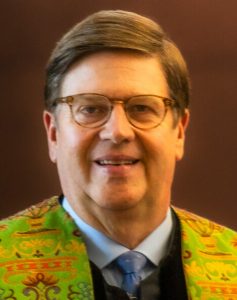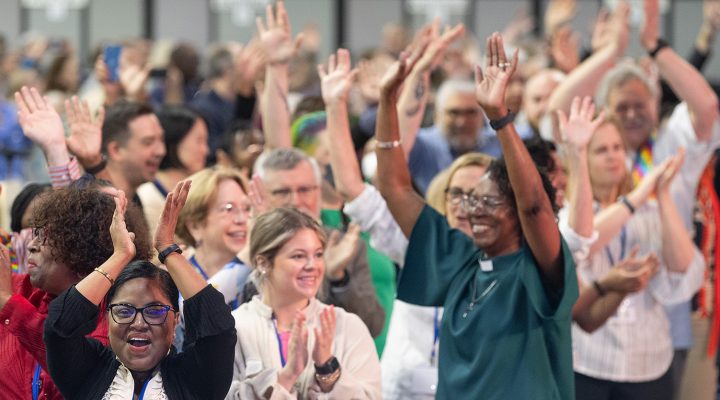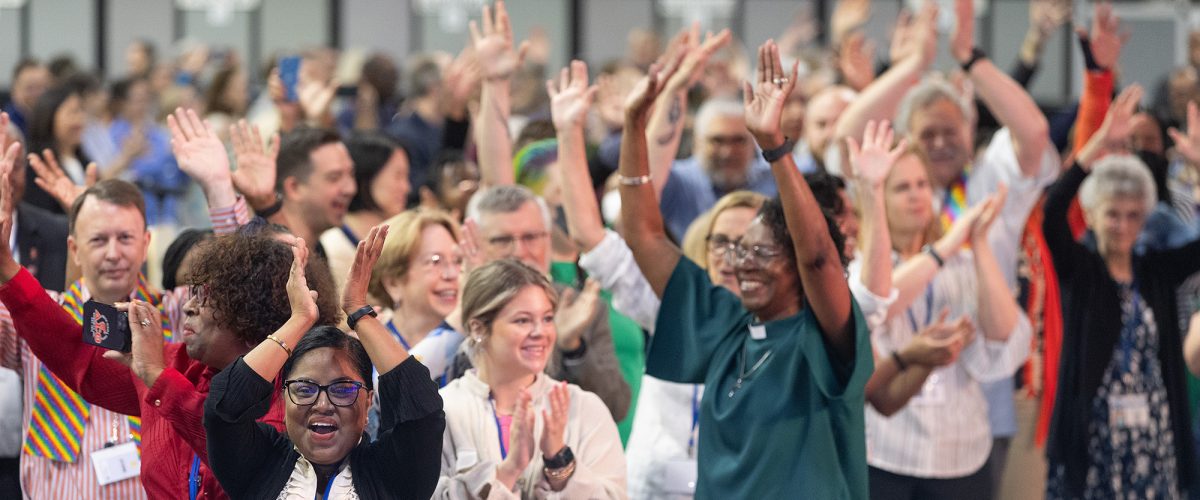Not surprisingly, some actions taken by The United Methodist Church’s General Conference last week are being characterized as unbiblical by those who believe they alone hold the only correct interpretation of the Bible.
We’ve heard this argument before, and it is not unique to United Methodists.
Within the UMC, however, the argument for biblical orthodoxy has been made a true culture war — a battle between African Methodists and U.S. Methodists.
Consider this comment posted on Facebook by a Methodist in Nigeria: “Africa will not accept the regionalization of the Bible.”
Here’s what that means: The UMC took two separate actions last week that worked together to make it possible for the denomination to become more inclusive of LGBTQ Christians. The first was a plan to allow more regional autonomy on certain issues, such as clergy ordination and marriage rites. The second was removing language from the UMC’s official documents that amounted to a total ban on same-sex marriage.
Allowing regions such as Africa — where Methodists tend to be much more socially conservative — to set ordination and marriage policies different than the United States — where Methodists tend to be more socially progressive — makes it possible to keep the international body together.
“For some conservatives, unity has been preserved at too great a price — doctrinal error.”
But for some conservatives, unity has been preserved at too great a price — doctrinal error.
Those views have been — and are being — promoted by groups such as the Wesleyan Covenant Association that have opposed more progressive forces in the UMC for decades. Even though many of the Americans in the WCA have left the UMC for a new conservative denomination — the Global Methodist Church — they continue to throw rocks back at the UMC and encourage others to do the same.
What will Africans ‘accept’?
What Methodists in Africa will or will not “accept” is a hotly contested question. One unofficial group of African Methodists wrote a letter published by the WCA that declared the UMC “has changed the United Methodist definition of marriage — not because the Bible has changed. But because Western culture has changed.”
Further, these five delegates to the UMC General Conference accused the UMC of following “what pleases man instead of what pleases God.” They said their denomination “now defines marriage differently from what God created it to be in the beginning (Genesis 2:18, 23-25). It has changed the definition of marriage from how Jesus described it in Matthew 19 as one man and one woman. In Africa we do not believe we know better than Jesus. We do not believe we know better than God. We do not believe we know better than the Bible.”
While this small group of African delegates claims to speak for most of African Methodists, other say that’s not the case at all.

Stan Copeland
Stan Copeland is a prominent UMC pastor who serves Lovers Lane UMC in Dallas — one of the denomination’s largest churches. He has many friends in Africa, he says, and his Dallas church includes members from more than a dozen African countries.
In a Facebook post last week, he called out the five African delegates who claimed to speak for the continent.
“I first question whether these men truly speak ‘for the majority of African delegates,’ and I doubt that they speak for the majority of United Methodists even in their five annual conferences, especially when their sisters and brothers back home come to know the truth about what has actually happened at the General Conference for the greater good for all,” Copeland wrote.
“It is absolutely certain that these do speak for the ones behind the support of the Africa Initiative. This is a group which the majority of African bishops have called out as intending harm to the United Methodist Church. The bishops pointed to the agitators and funders — the Wesley Covenant Association and their co-conspirators Good News, Institute of Religion and Democracy — as being unwelcome with their misleading agenda promoting a new denomination.”
Further, Copeland wrote, simple math shows African delegates to the General Conference must be supportive of regionalization and the other key votes taken last week because they all passed with 75% to 80% support.
And it was a female African delegate who offered an amendment to the updated Social Principles that spoke of marriage as a lifelong covenant between “two adult persons of consenting age” rather than referencing only one man married to one woman.
“I challenge the drafters of the press release to present evidence of their claims that an unnamed Mainstream leader wrote, ‘The United Methodist Church should be willing to lose Africa to fulfill its progressive agenda.’ The other statements are just as ridiculous about people saying Africans are ‘speaking too loudly’ or a bishop saying, ‘You Africans need to grow up and think for yourselves.’ We would be hard pressed to name another denomination that works so intentionally to hear the voices of all people at the table of decision, which is our General Conference.”
‘Regionalization of the Bible’
It was in response to Copeland’s Facebook post that the man from Nigeria said, “Africa will not accept the regionalization of the Bible.”
That assertion then was challenged by Robert Hunt, global missions professor at SMU’s Perkins School of Theology.
On his personal blog, “The Crossroads of Christianity and Culture,” Hunt wrote: “It would be interesting to know exactly where the idea of ‘regionalization of the Bible’ came from, but a good guess is that it came from Good News Movement propaganda based on recent writings by Rob Renfroe and others.

Robert Hunt
“So it needs to be stated that the regionalization amendments to the UM Constitution do not regionalize the Bible. They place certain types of decisions in the hands of regional and local church leaders in order for those decisions to be made in culturally sensitive and socially appropriate fashion.”
He added: “We need to call BS on this idea that regionalization entails ‘regionalization of the Bible.’ It is a crude political slogan that is useful only for those who benefit from dividing the UMC.”
Hunt listed six areas where regionalization allows decisions: Criteria for ordained and licensed ministry; criteria for specialized lay ministries; criteria for admission of and care for lay members; organization of the regional, annual, district, and charge conferences; hymnals and rituals; judicial administration.
“You’ll notice there is no mention of interpretation of the Bible in this list,” he said.
What’s Bible and what’s culture?
And yet, to the most conservative elements of Methodists, Baptists, Presbyterians, Episcopalians, Lutherans and other Protestant Christians, these very things are about the Bible because everything is about the Bible.
No difference in marriage rites or even hymns can be broached because conservative biblical orthodoxy requires strict conformity. In this worldview, to have fellowship with others who claim to be Christians yet allow same-sex marriage or allow hymns that do not gender God as male is heresy itself.
“This is not an African issue; it is an American issue.”
This is not an African issue; it is an American issue. It is the same battle every Protestant denomination in America has fought in recent years. And it is a battle for strict orthodoxy to a certain way of reading the Bible often touted as biblical inerrancy. It allows no collaboration or compromise.
As an informed outsider looking in, it appears to me the conservative forces that lost the battle to control the UMC — and left to form their own denomination — are now putting words in the mouths of Africans to stir up racial conflict.
We should always be wary of those who leave a group angry and then want by any means necessary to burn down the house they left. And once again, that is not a Methodist problem, it’s also a Baptist problem I’ve seen firsthand.
When our Baptist church voted to become fully inclusive in 2016, we lost several hundred members — most of whom moved to the same larger Baptist church down the road. But a few of them could not leave quietly. They continued to work for more than a year to discredit the church they chose to leave — disseminating “reports” among their group on how bad things were since they left.
The problem was those reports weren’t true. They were fabrications of angry people seeking to justify themselves. In time, they wore themselves out and gave up the fight. Which was wise, because back at the church, things were going pretty well.
Perhaps the same will be true for the UMC as it adjusts to its new reality. Hopefully those who fled to the new Global Methodist Church will find a way to invest their energies more positively in building up rather than tearing down.
But do not forget that to them, it’s all about the Bible.

Mark Wingfield
Mark Wingfield serves as executive director and publisher of Baptist News Global. He is the author of Honestly: Telling the Truth About the Bible and Ourselves and Why Churches Need to Talk About Sexuality.
Related articles:
UMC delegates remove ban on LGBTQ clergy by consensus vote
UMC General Conference removes much of LGBTQ restrictions in consensus vote
UMC gives first approval to restructuring plan


